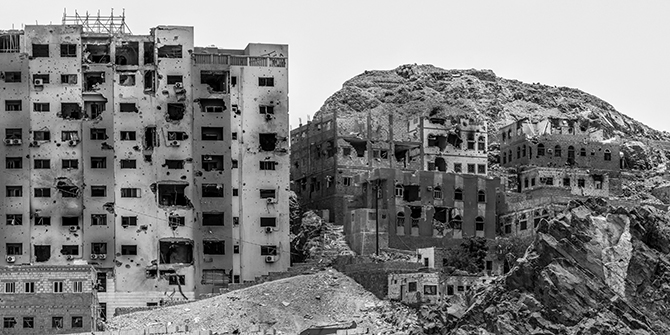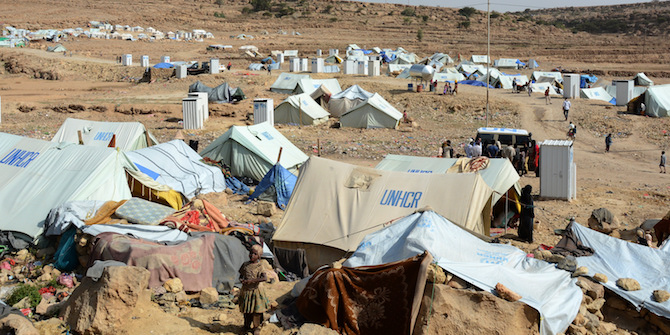by Suha Bashren
#LSEYemen

Today, every Yemeni, living within or outside Yemen, longs for peace through the peace talks in Kuwait.
One of the consequences of the current war in Yemen is that human development indicators are now very low. According to UN reports, 82% of Yemenis need humanitarian assistance, 14 million people are vulnerable to food insecurity, 8.7 million people are severely famished, and 230,000 children are malnourished and wallowing in abject poverty. Besides that, the casualty toll is painfully high, as about 32,000 civilians have lost their lives during this brutal battle.
Even though both national and international human rights organisations have highlighted the unpalatable high level of deterioration in their reports, the war in Yemen has continued unabatedly. The ground clashes initiated by the Houthis and the airstrikes by the Arab Coalition have contributed to the death of civilians and destruction of infrastructure in Yemen.
While the war is ripping the country apart, the deafening silence of the so-called world powers is worrisome. The humanitarian catastrophe in Yemen was so appalling that the UN has placed the country in the same class of severity as Syria. The only difference between the two troubled countries is that the war in Syria has been going on for five years while that in Yemen only started a year ago.
Sometimes, I wish all these unfortunate incidents happening in Yemen were just a nightmare, a delusion. In fact, I wish none of these causalities and sufferings had happened. Anytime I saw footage of destruction in conflict zones around the world before the war in Yemen, I would just feel sorry for the victims without understanding the ramifications of the catastrophe. Now, I understand better what war means. I understand what it means to live in a troubled region where chaos, bloody battles, air strikes, and carnage are widespread. While I understand that the price of war is always high and that civilians are more likely to suffer, it is dire to see your city destroyed by some contentious groups and your people mutilated by airstrikes and deadly assaults.
There had been several attempts by Ismail Ould Sheikh Ahmed, UN Special Envoy to Yemen, to bring warring parties to one table so that they can negotiate a ceasefire and commence peace talks. I hope that these negotiations will end the misery and harrowing experience that Yemenis have been going through for more than a year. A number of political analysts believe that this round of talks might be the last chance for Yemen to end this war. And I hope our politicians will not waste this opportunity to avert the impending war.
 Suha Bashren is a strategic, multidisciplinary development practitioner with a passion for gender equality and women empowerment. Suha has worked in the development field for around 15 years with several organisations including the UN, international, and national NGOs. Suha tweets @Suhabashren.
Suha Bashren is a strategic, multidisciplinary development practitioner with a passion for gender equality and women empowerment. Suha has worked in the development field for around 15 years with several organisations including the UN, international, and national NGOs. Suha tweets @Suhabashren.
Other contributions include:
- For lasting peace in Yemen, bring women to the table
by Rasha Jarhum
- Beyond the North/South narrative: Conflict and federalism in Eastern Yemen
by Eleonora Ardemagni
- Navigating the challenges of war through social innovation
by Mazen Al-Hebshi
- Doing art in the vacuum of war
by Reem Jarhum
- Shall we think of war victims as humans, not numbers?
by Sala Mohammed






